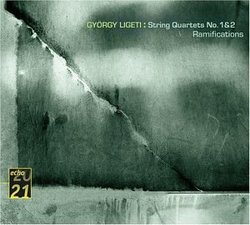| All Artists: Gyorgy Ligeti, Pierre Boulez, David Atherton, Hagen Quartett, LaSalle Quartet, Ensemble InterContemporain, London Baroque Sinfonia Title: Ligeti: String Quartets Nos. 1 & 2; Ramifications Members Wishing: 2 Total Copies: 0 Label: Philips Import Release Date: 9/3/2003 Album Type: Import Genre: Classical Styles: Chamber Music, Historical Periods, Classical (c.1770-1830), Modern, 20th, & 21st Century Number of Discs: 1 SwapaCD Credits: 1 UPC: 028947432722 |
Search - Gyorgy Ligeti, Pierre Boulez, David Atherton :: Ligeti: String Quartets Nos. 1 & 2; Ramifications
 | Gyorgy Ligeti, Pierre Boulez, David Atherton Ligeti: String Quartets Nos. 1 & 2; Ramifications Genre: Classical
|
Larger Image |
CD Details |
CD ReviewsGood performances, great pieces, and excellent sound quality Christopher Culver | 03/14/2004 (5 out of 5 stars) "Ligeti's "String Quartet 1 (Metamorphoses noctunes)" is wonderful, an avant-garde and experimental work which never quite departs from easy listenability and enjoyment. He constantly builds peaks of sound and then reduces them for a few moments of tranquil repose. The Hagen Quartett's performance is very strong and steady, but I rather prefer the Arditti Quartet's performance of the piece (released on the first volume of Sony Classical's "Gyorgy Ligeti Edition"), which is more frenetic and does a great job of emphasing the hairpin turns and idiosyncracy of the work.Ligeti's "String Quartet No. 2", dating from fifteen years after the first, is solid, though perhaps a little disappointing in comparison to the first. Ligeti claims it is a vast survey of the entire string quartet tradition compressed into a form much smaller than his first string quartet. There are rapid shifts from style to style, and little collaboration between each of the players. This proves a very slippery piece, and I've never gotten hold of it."Ramifications" (1968-69) is a minor work in which half of its twelve solo strings are tunes a quarter-tone lower than the other half. Ligeti then explores the surreal interaction among the strings. While it is something of a novelty and not a major piece, this is a wonderful use of his micropolyphony technique, and the performance led by Pierre Boulez (himself a influential contemporary composer as well as a conductor) is one of the best recordings of it.The "Sonata for Solo Cello" is one of Ligeti's earliest works, dating from 1947, and its first half will strike the listener as, well, rather conventional. It is a sweet use of a moving instrument that Ligeti studied while attending the conservatory in Kolozsvar in Transylvania. The second part, added six years later, shows a much more daring and witty composer at work and in fact may be said to accompany the string quartets."Melodien" is an ironic piece. While early Ligeti works, such as "Musica Ricercata" resisted the creative vacuity of Hungary's Stalin-imposed socialist realism, this piece rebels against the excesses of his own avant-garde fellows. While many contemporary composers where eschewing melody, Ligeti gives us here over 10 minutes of pure melodies, with a beautiful colour which Ligeti has called "iridescent and metalic". The highs get higher and the lows get lower, and the work eventually diffuses into nothingness. This performance by the London Sinfonietta is superb, and I would definitely recommend it over the Schoenberg Ensemble's 2000 recording in the first volume of Teldec's "The Ligeti Project", whose sound I find unimpressive.Some of the recordings here are from as long ago as 1975, but Deutsche Gramaphone's Ligeti reissues tend to often sound better than more recent ones. Recent recordings indeed are worth getting, many are supervised by Ligeti himself (and contain liner notes written by him), but these reissued classics will make a worthy addition to one's collection."
|

 Track Listings (26) - Disc #1
Track Listings (26) - Disc #1